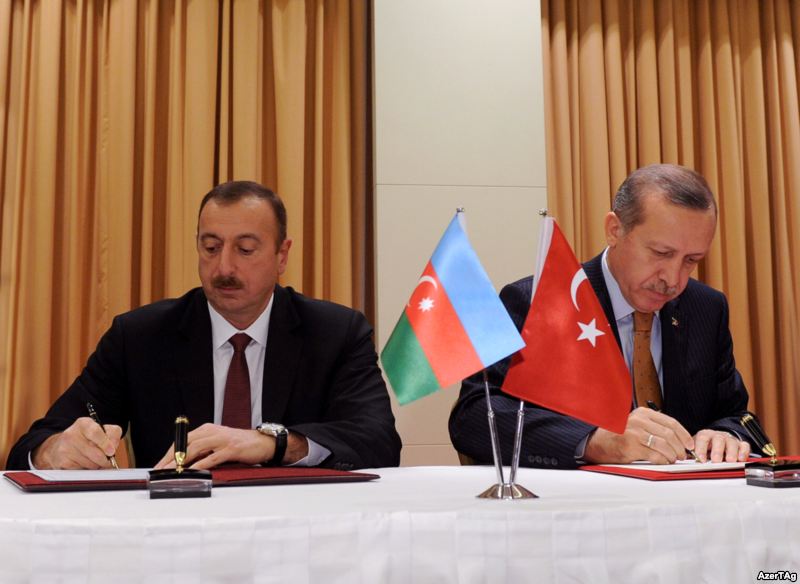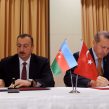
Azerbaijan and Its Gas Consortium Partners Sign Agreements With Turkey
Publication: Eurasia Daily Monitor Volume: 8 Issue: 201
By:

On October 25 in Izmir, Azerbaijan’s President Ilham Aliyev and Turkish Prime Minister, Recep Tayyip Erdogan, witnessed the signing of agreements on the delivery and transit of Azerbaijani gas to Turkey and onward to European Union territory (Trend, Anatolia news agency, Platts Commodity News, October 26-28).
These long-awaited agreements establish legal and commercial terms for gas transit from Azerbaijan to Europe via Turkey and, separately, for Azerbaijani gas supplies to Turkey. The agreements also reshuffle the cards in the competitive tender, by which the Shah Deniz producers’ consortium in Azerbaijan are choosing a pipeline route to Europe from among four options. BP has reconfigured the Nabucco project radically, adding this new option to the pre-existing three. Beyond this, the Izmir agreements open the way to far larger gas volumes in the post-2020 stage of Azerbaijan’s gas export strategy.
Energy Ministers, Taner Yildiz and Natig Aliyev, signed an intergovernmental agreement and a framework agreement on the transit of Azerbaijani gas to Europe via Turkey. That gas enters Turkey via Georgia. The documents envisage using either the pipelines of Turkey’s Botas state company, or a new pipeline to be built across Turkey, for transporting Azerbaijani gas to Turkey’s borders with Greece and Bulgaria. The apparent intention is to build a new pipeline, dedicated to Azerbaijani gas, if and when the transit volumes begin exceeding the spare capacities in Botas’s pipelines.
Botas CEO Fazil Sener and Rashid Javanshir, head of BP’s operations in Azerbaijan, signed a transit agreement for Shah Deniz gas from the Georgia-Turkey border to the Turkey-Greece and Turkey-Bulgaria borders. Javanshir acted on behalf of the Shah Deniz producers’ consortium, in which BP holds the operating rights. Commercial production from Shah Deniz Phase Two is expected to start in 2017. The consortium plans to export 10 billion cubic meters (bcm) of gas per year to Europe in the period 2017-2042.
Azerbaijan’s State Oil Company (SOCAR) president, Rovnag Abdullayev, and Sener signed a sale-and-purchase agreement on Azerbaijani gas supplies to Turkey from Shah Deniz Phase Two. This agreement covers pricing issues and delivery volumes. Turkey had earlier secured Azerbaijan’s commitment to deliver 6 bcm of gas annually from Shah Deniz Phase Two. Azerbaijan is currently delivering 6.6 bcm per year to Turkey from that same project’s Phase One.
The Economy Ministers, Shahin Mustafayev and Zafer Caglayan, signed an agreement on mutual protection of investments in Azerbaijan and Turkey. This agreement will be relevant in the increasingly plausible eventuality of Azerbaijan acquiring a direct stake in gas transportation via Turkey.
The agreements’ signing coincided with the inaugural meeting of the Turkey-Azerbaijan High-Level Strategic Cooperation Council, co-chaired by Erdogan and Aliyev. Significantly, the Cooperation Council did not discuss the documents that cover the transit of Azerbaijani gas to Europe via Turkey. The Turkish side said that the transit agreements are a matter for direct discussions between the gas producers in Azerbaijan and gas customers in Europe. This attitude reflects an improved Turkish understanding of a transit country’s role. Commercial and technical details are not public, and some details remain to be finalized in 2012.
According to SOCAR president Abdullayev, the agreements just signed open the way for Azerbaijan to maximize its gas exports to Europe in a follow-up stage. Azerbaijan expects to produce some 50 bcm of gas annually from 2025 onward, once the Umid, Absheron, and Shafag-Asiman offshore fields (see EDM, October 13, 2010, September 12, 2011) start commercial production, on top of Shah Deniz. The lion’s share of Azerbaijan’s total gas production will then be available for export.
That would necessitate building a new export pipeline, dedicated to Azerbaijani gas, via Turkey to EU territory. In the wake of the signing event in Izmir, Abdullayev has recommended drawing up a feasibility study for a dedicated pipeline in 2012, putting the line’s first stage into operation by 2017, and expanding its capacity in subsequent years, correlated with gas production growth in Azerbaijan. Building a dedicated pipeline would be a joint Turkish-Azerbaijani project, with possible third-party involvement (presumably by Western partners in Azerbaijani gas extraction projects). Leaving no doubt about Baku’s interest in such a project, Abdullayev stated that “President Ilham Aliyev is the initiator” (Trend, October 26).
The Izmir agreements remove the last legal and commercial impediments to gas transit from Azerbaijan to EU territory via Turkey. These agreements make it possible for gas producers in Azerbaijan and buyers in Europe to enter into commercial transactions directly. The signing allows Shah Deniz consortium partners to proceed with the final investment decision for Phase Two of field development, costing $20 billion. This step will in turn allow the producers’ consortium to select (and possibly reconfigure) the pipeline route to Europe from among the rival options, all via Turkish territory. And those decisions will make it possible to sign gas supply agreements with European customers for gas sourced in Azerbaijan.




